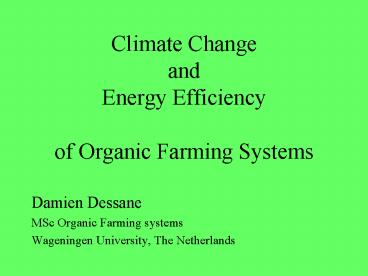Climate Change and Energy Efficiency of Organic Farming Systems - PowerPoint PPT Presentation
1 / 23
Title:
Climate Change and Energy Efficiency of Organic Farming Systems
Description:
Food processing, particularly keeping foodstuffs chilled in factories and in ... is usually worse than equivalent minimally processed ambient foodstuffs. ... – PowerPoint PPT presentation
Number of Views:226
Avg rating:3.0/5.0
Title: Climate Change and Energy Efficiency of Organic Farming Systems
1
Climate Change and Energy Efficiency of
Organic Farming Systems
- Damien Dessane
- MSc Organic Farming systems
- Wageningen University, The Netherlands
2
Contents
- State of Global Warming
- Relations between agriculture and GW
- Energy Efficiency as an indicator for GW
Potential - Results from 4 Studies (ORG/COV comparisons)
- Why is Organic farming more EE and emits less GHG?
3
Temperature and Greenhouse gas since the
industrial revolution
Source IPCC, 2007
4
Temperature and Greenhouse gas concentration
Source IPCC, 2007
5
Historical climate anomalies
Source IPCC, 2007
6
World GreenHouse Gas (GHG) flow chart by
sectorCO2 CH4 N2O
7
Sectoral contribution to Global Warming
8
(No Transcript)
9
Contribution of Agriculture to Global Warming
- Whole food chain 20 of the total GHG.
- (including transportation, storage, processing,
consumption and preparation) - Agriculture 15 of the total world GHG.
- (World Resource Institute, 2000)
- CH4 Livestock and wetland rice (42)
- N20 Tillage, Fertilizers (specially NPK) (48)
- CO2 Fossil fuel, land clearing, biomass burning
(12)
10
Effect of Global warming on Food production
- IPCC (reports 2007) predicts a rise in Temp of
1.4 to 4C at the end of the 21st Century - Positive effects
- Increase in plant production due to higher CO2
concentration - New areas for production (high latitudes)
- Negative effects
- Drought, storms and flood should be more frequent
- Precipitation will be decreased in continental
climates - Low latitude (close to equator, mainly Africa and
Latin America) areas will suffer a large
production decrease (10 to 20 by 2080, Kotschi
2006) .
11
Energy/Environment/Agriculture relations
CO2 CH4 N2O
Non-renewable energy 86
Environment
Energy
Renewable energies 13
Fuel Fertilizers Electricity Transport
Carbon Sequestration Agro-biodiversity Landsc
ape
Nutrient export Contamination
?
US
Agriculture
AgroFuel
Maximize inside arrows Minimize BLUE
arrows Ratio orange arrow/red arrow Energy
Efficiency
12
Energy Efficiency the Planete method
13
Calculation of the Energy Efficiency
- EE ---------------------------------------------
----
Energetic value of the product (Joules or
Calories)
Non renewable Energy used during production
processes (Joules or Calories)
14
Results from 4 studies
- Olives (EL)
- Energy Efficiency LCA of organic and
conventional olive oil Damien Dessane - ORG/COV Energy efficiency 6/3 20 less GHG.
- Grapes (TR) Erdemis Gundogmus, Aegean region
- ORG/COV 26 more efficient.
- Rodale institute (US) (23 years)
- ORG/COV sequestering 15-28 more Carbon in the
soil Converting the US corn - and soybeans satisfy 73 of the Kyoto targets for
CO2 reduction . - DOK experiment (CH) (since 1978)
- ORG/COV Energy use 48 less 36 lower GHG
emission.
15
Improved Carbon Sequestration of Organic Practices
Conservation Prairie
16
Why Organic farming contributes less to Global
Warming?
- 1. Reduced consumption of fossil fuels for energy
and synthetic fertilizers, - 2. More renewable energy used,
- 3. Increases soil methane oxidation rates - by
not using fertiliser, organic farming maintains
the role of soil micro-organisms in oxidising
atmospheric methane. - 4. No burning of pruning/harvest residues,
- 5. Reduced transport - local production system.
- 6. Increases the carbon content of soils,
17
Why Organic farming is more Energy Efficient ?
- Reduced consumption of fossil fuels for energy,
- No fossil fuel used for synthetic fertilizers,
- Reduced transportations-local resources
- Equivalent yields or slightly lower (Cranfield
University)
18
The role of Organic Farming to combat Global
Warming
- Organic agriculture not only enables
agroecosystems to better adapt to the effects of
climate change but also has high potential to
reduce the emissions of agricultural greenhouse
gases. - (FAO report, 2007)
- Resilience
- Mitigation
19
- Thank you
20
Recommendation to Policy-Makers
- Make mitigation practices economically attractive
to farmers (Cov and Org). - Subsidies types of organic farming that provide
mitigation and resilience potential. - Encourage research on land management and soil
conservation techniques. - Tax NPK fertilisers.
21
Recommendation to Consumers
- Is organic better? may not be the right
question to ask - Organic tomatoes grown in March in heated Dutch
glasshouses will be far worse for the environment
than imported conventional Israeli fruits.
Someone trying to minimise the GHG impact of the
food he or she eats would probably do best to
follow some simple rules - Animal products are generally worse for GHGs than
plant-based foods, so vegan diets are far better
than carnivorous. This result is generally
agreed. - Food processing, particularly keeping foodstuffs
chilled in factories and in supermarket
refrigerators, is usually worse than equivalent
minimally processed ambient foodstuffs. - Local food is not necessarily better than food
from afar. Food miles do not necessarily imply
high greenhouse gas emissions Sugar made from
Brazilian sugar cane, which has very low
fertiliser input, may have a much lower carbon
impact than East Anglian sugar beet, which has
taken large doses of nitrogen fertiliser and then
required substantial amounts of energy to
process. But, all other things being equal, local
food grown and sold in its natural season and not
retailed through energy intensive supermarkets is
better than products grown on the other side of
the globe. - So, in a conclusion that will not please
high-living gourmands, - The best foods from a climate change viewpoint
are - unprocessed, unpackaged vegan wholefoods sold
locally and produced in season. - ?Shopping at local organic markets can save the
planet!
22
Emissions of Greenhouse gases scenario
23
Depreciation of GreenHouse Gas GHG































